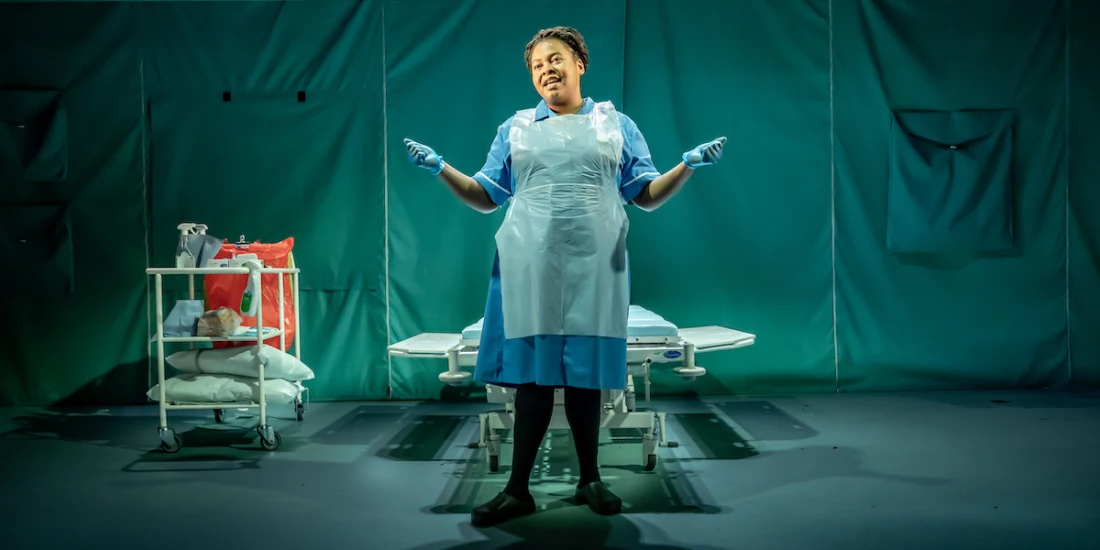'Marys Seacole' review — this expressive play rips up the bio-drama
There is your standard bio-drama, and then there is Jackie Sibblies Drury’s Marys Seacole. This time-travelling, shape-shifting, intermittently dazzling tribute to the 19th-century British-Jamaican nurse also crashes into the present day, closing the gap between different wars in Ukraine, between the experience of carers, of working mothers, and of Black women.
British audiences were first introduced to the experimental American playwright when her Pulitzer Prize-winning Fairview ran at the Young Vic in 2019, directed by Nadia Latif. Latif is back for Marys Seacole, along with designer Tom Scutt, who supplies a flexible backdrop that resembles the fabric of a nurse’s uniform, complete with giant pockets.
It’s trickier to discuss the play’s content — not least since Drury fiercely interrogates the structures of biographical narrative, as well as introducing multiple twists. Suffice to say that it begins with Mary Seacole, who tells us she learnt about herbal remedies and healing from her mother in Jamaica. She later applied to care for British soldiers in Crimea, but was rejected by the racist War Office. So, she travelled there herself and established the British Hotel just behind the lines.
The pioneering Seacole is something of a reclaimed figure. Belatedly, she has been recognised with a statue at St Thomas’s Hospital in London, and she is now on the national curriculum. But for many years, we heard far more about her white contemporary, Florence Nightingale. As Salman Rushdie puts it in his Satanic Verses, Seacole “did as much in the Crimea as another magic-lamping lady, but, being dark, could scarce be seen for the flame of Florence’s candle.”
However, Drury’s ambition – for better and for worse – extends far beyond putting Seacole centre stage. There is a glimmer of that more conventional portrait, with the phenomenal Kayla Meikle embodying an imperious Mary in full Victorian dress, but the plural in the title is crucial. Drury asks how one person can be everything, and then gleefully scatters aspects of Mary’s identity around the entire cast.
There’s Mary the brusque mother, the abandoned daughter, the fearless carer, the self-regarding myth-maker, the victim of prejudice, the tough mentor, and the Black woman left mopping up the messes left by white people, ranging from Seacole’s era to NHS staff today. Earlier lines and ideas swim into new focus later in the show – it’s a bit like stepping back and seeing the whole effect of a pointillist painting.
However, some of those early scenes are too long and too blunt in their messaging. You come away with expressive snapshots, like the cringe-inducing moment when an exhausted white mum tries to bond with two black nannies in the park by chattering about her resort holiday in Jamaica, before expecting them to comfort her. Or there’s the sudden shocking immersion into the mud, blood and chaos of wartime nursing.
But while you get the point that Mary is grappling with identity, repeating “I” and “me”, and Drury is (to borrow from Hamilton) questioning “who lives, who dies, who tells our stories”, it’s actually tricky to get a handle on the details of Seacole’s extraordinary life. Since history wrongly erased her, I wished she was afforded more breathing room here.
Still, Meikle gives a blazing central performance, brilliantly supported by Olivia Williams, Esther Smith, Susan Wooldridge, Llewella Gideon, and a strong professional debut from Déja J Bowens. Jessica Hung Han Yun’s lighting and Xana’s sound queasily blur places and time periods, insistent drumbeats and flickers of light keeping war on the edge of our consciousness.
Drury’s postmodern play does feel rather like a manifesto made flesh. But it also makes a genuine effort to give us a multifaceted Mary, in all her pain and glory. Instead of a saint or a distant historic figure, she becomes a vivid figure who we must grapple with to make sense of our lives today.
Marys Seacole is at the Donmar Warehouse to 4 June. Book Marys Seacole tickets on London Theatre.
Photo credit: Marys Seacole (Photo by Marc Brenner)
Originally published on
